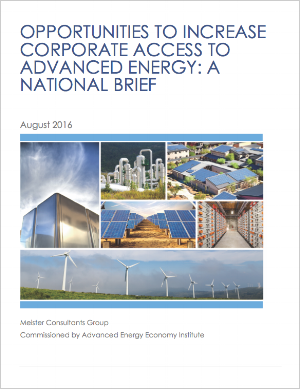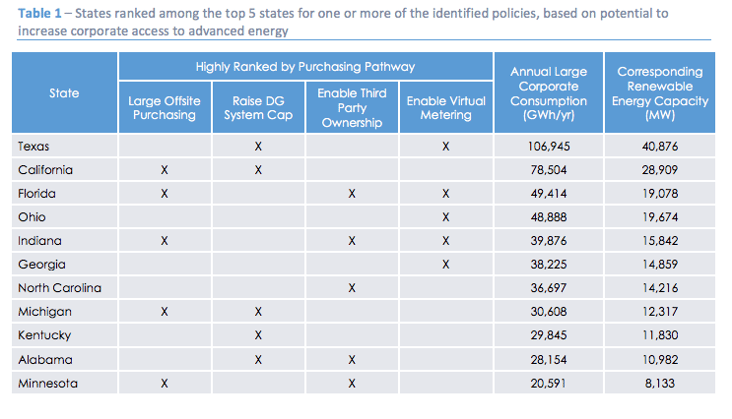 It’s no mystery that companies want advanced energy—they’re announcing major projects, making large purchases, and setting public goals. Even for companies without a specific target, advanced energy presents an attractive option to control and lower energy costs. Unsurprisingly, companies are pursuing advanced energy in growing numbers, with a record 3,100 MW of wind power purchases in 2015 signed by corporate customers—double the previous year.
It’s no mystery that companies want advanced energy—they’re announcing major projects, making large purchases, and setting public goals. Even for companies without a specific target, advanced energy presents an attractive option to control and lower energy costs. Unsurprisingly, companies are pursuing advanced energy in growing numbers, with a record 3,100 MW of wind power purchases in 2015 signed by corporate customers—double the previous year.
But as companies sign power purchase agreements, build rooftop solar installations, install energy storage solutions, and develop fuel cell facilities, impressive national growth trends obscure the important fact that, in many states, the options to pursue such projects are limited at best. To identify how and where the list of purchasing options could be expanded, Advanced Energy Economy Institute commissioned Meister Consultants Group (MCG) to consider opportunities to increase corporate access to advanced energy through policy changes at the state level. What MCG found is six policies that would give corporate purchasers the renewable energy they are looking for, and 11 states that could reap the benefits of the advanced energy development that would result.
The report, Opportunities to Increase Corporate Access to Advanced Energy: A National Brief, looks at six policy options, identifying states with the largest corporate demand and strongest renewable resources in which the policies could expand options for corporate consumers. After considering states’ regulatory and political environments, 11 states stood out. The report summarizes the top five for one or more of the policies profiled on the basis of its potential to increase corporate access to renewable energy. Of these, 11 states made the top 5 list for one or more of the policies: Alabama, California, Florida, Georgia, Indiana, Kentucky, Michigan, Minnesota, North Carolina, Ohio, and Texas. Applicable policy options for each state are shown in the table below.

The report breaks down policy options into two major categories according to the types of access they enable: large-scale offsite purchases, and smaller onsite facilities.
Three policies outlined in the report enable companies to purchase electricity from large-scale renewable energy projects, opening up purchasing options generally not available to companies in states that do not allow electric choice. Specifically, Utility Renewable Energy Tariffs give companies the option to opt into a portfolio of renewable energy competitively sourced by their utility, “Back-to-back” Utility PPAs provide a mechanism for a customer to contract with a renewable energy developer with the utility acting as an intermediary, and Direct Access Tariffs allow certain customers in traditionally regulated markets to choose their electricity source. The states that could most benefit from these policies were distinguished by their large commercial and industrial sector and strong resource potential.
The three remaining policies allow companies to access energy from distributed energy resources. While many states around the country have policies in place that support onsite or distributed advanced energy, not all of these policies are structured to enable the participation of larger corporate users. The report identifies three policies that states could expand corporate access to distributed energy resources: raising system size limits for programs that credit distributed generation, such as net metering, allowing third-party ownership of onsite generation systems, and allowing virtual or aggregated metering to enable companies to benefit from distributed energy even when their needs are not met by a single onsite system at a single building. The top five states for each of these policies were identified by their strong commercial and industrial sector load at facilities capable of hosting onsite resources, and by their strong solar potential, since distributed generation is currently dominated by solar PV.
In a report focused on how and where, it’s easy to lose track of why, but for states interested in attracting and retaining top corporations the motivation is clear. Commenting on release of the report, Rob Bernard, chief environmental strategist at Microsoft, summed it up by saying, “Expanding renewable energy is a top priority for Microsoft, and we’re committed to using more clean energy every year. That requires greater availability of renewable energy in the markets where we operate.” Other companies agree. Patrick Flynn, director of sustainability for Salesforce, said his company has “made a corporate commitment to power 100 percent of our operations with renewable energy,” while Steven Center, vice president of the environmental business development office at American Honda Motor Co., Inc., called Honda’s commitment to renewable energy “a driving force for the future.”
States that ignore this driving force do so to their own detriment, ignoring not only corporate needs but a huge opportunity to expand advanced energy markets. To put the opportunity of policy action (or opportunity cost of inaction) into perspective, if half of electricity demand from commercial and industrial customers nationally were met by renewable energy, this would drive development of nearly 450 gigawatts (GW) of renewable energy—more than double current capacity nationwide, and enough to power over 100 million houses. Those states that lead the charge have the best shot at hosting new advanced energy development and attracting more happy corporate citizens. Sounds to us like an easy policy choice.
Download the report, "Opportunities to Increase Corporate Access to Advanced Energy," at the link below.
